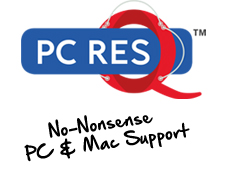A common error I see in peoples buying habits, is purchasing a piece of kit that’s ‘OK for now.’
It might save them a few pounds today, but long term, it’ll cost them a lot more.
Imagine you buy yourself a nice-looking laptop, that comes with 120GB of storage, because you think this will be more than enough, as you just need it for basic internet and email access.
What you’ll find though, is that 120GB will get used up very quickly, even if you only use it to store a few pictures and documents. And that’s because your Mac or Windows system is constantly downloading updates and taking up more space.
And when a new Operating System (OS) is released, you’ll probably find that you won’t have enough free disk space to install the latest OS and keep it safe and up to date.
This is just an example, but here’s my list of DO’s, when it comes to buying a new PC or Mac.
> Make sure the storage capacity of your new computer is larger than what you think you need. TIP: Go for a minimum of 250GB, but of course, this is dependent on the amount of data you have. Because, if you have 150GB of data, then it would make common sense to go for a 500GB instead.
> If budget allows, go for an Intel i5 processor at a minimum.
> This is an important one – Avoid machines that come with a traditional hard drive (referred to as either a HD or HDD). Make sure the storage is labelled as SSD, which stands for Solid State Disk. Taking this advice alone, will save you hours of waiting for things to load.
> Extend the standard warranty. Depending on the specification, this can be increased to either three or five years. The additional cost is miniscule, compared to the cost of repairing a fault, if it’s outside the standard 12-month warranty.
CONCLUSION
Buying a new system that’s more powerful, with more capacity than what you need today, will pay you handsomely long term.
I’ll give you an example of a HP Desktop that I bought eleven years ago, with a specification far greater than my needs at the time. And it’s only now that I’m thinking of replacing it, as I’m not able to upgrade it to Windows 11. Eleven years is a pretty good run though.
Avoiding the above suggestions, means that you’ll soon become frustrated with a poor performing system, with very little storage space left. And you’ll also end up spending more money to upgrade your current system or replacing it sooner than you’d like with another machine.





